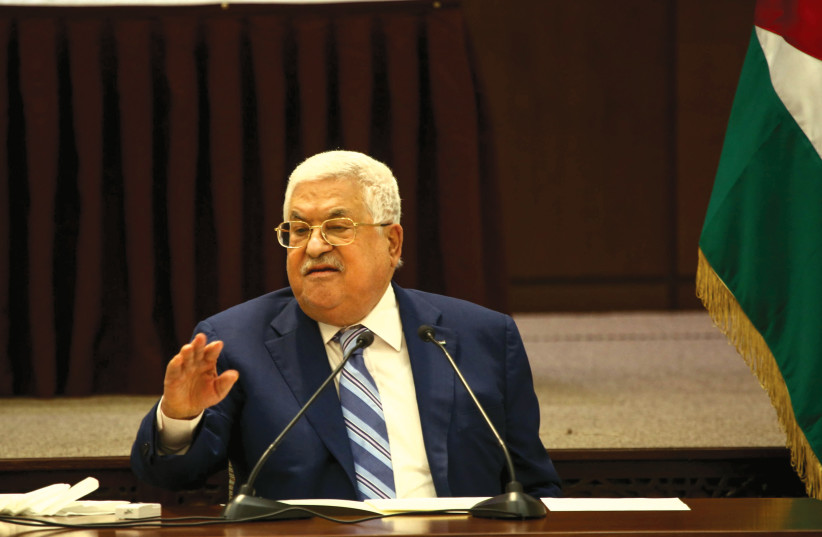The Palestinian Authority is in trouble, and Israel is trying to save it.
On Sunday, July 9, Israel’s security cabinet approved a measure to “prevent the collapse of the Palestinian Authority.” The measure came with a list of conditions which included that the PA stop attacking Israel in both legal and political forums, that they stop incitement in media and education, halt the pay-for-slay payments in which terrorists and their families are compensated for acts of terror, and refrain from building in Area C of the West Bank.
To nobody’s surprise, Palestinian officials quickly rejected the measure.
The PA is a self-governing body established in 1994 as part of the Oslo Accords. It exercises partial governance over Areas A and B in the West Bank and maintains administrative control over various civil matters, including education, healthcare, and public services. The PA was intended to serve as an interim government, paving the way for a future independent Palestinian state through negotiations with Israel.
The Palestinian Authority is holding on by a thread
The PA also controlled the Gaza Strip until January 26, 2006, when the Hamas terror group won the parliamentary elections after Israel’s disengagement from Gaza in 2005.

Fast forward to today, the PA is holding on by a thread.
Its failure to lead the Palestinians and come to a compromise with Israel has made it wildly unpopular and has left many Palestinians to turn to radical groups instead. In no way is the PA an ideal partner for Israel and Netanyahu’s attempt to salvage it has surprised many.
But those who understand what is fomenting in the West Bank know that if the PA collapses, something much worse will likely take its place. The fall of Abbas and his failed government would open the door for Hamas and other Iranian-backed terror groups waiting to swoop in and take over.
A recollection of the Palestinian Authority's present-day troubles
The recent IDF operation in Jenin exposed how weak the PA has become and the dangers that await Israel if Iranian faction groups take its place. Some analysts attribute the PA’s weakness to Israel for stripping it of its resources, and others attribute it to its president Mahmoud Abbas, who has spent two decades in power and has achieved nothing.
Shortly after the House and Garden operation, Abbas visited Jenin with his security team for his first public appearance since 2005.
The Washington Post reported that as Abbas spoke, groups of Palestinians gathered around him and chanted “Battalion! Battalion!” in reference to the Jenin Battalion, a local Palestinian militant group founded by a member of Islamic Jihad.
From unpopularity to near collapse: The current state of the Palestinian Authority
Two PA officials were chased away by mourners from the funerals of the 12 militants that Israel killed. Later that day, Palestinian security forces used tear gas on protesters throwing stones at the security headquarters.
It has become abundantly clear that the PA is losing credibility, so much so that it can no longer police the northern West Bank. The best the PA can do is stay out of Israel’s way when the IDF needs to intervene and conduct counterterror operations, to prevent incoming attacks. This has led to many Palestinians labeling Abbas and Fatah leaders as collaborators with Israel.
The combination creates more animosity, fueling more hate among the Palestinian population, which the data only reinforces.
Understanding the Palestinians' rising support for radicalized groups
One of the main reasons Abbas is unpopular is because he is one of the last politicians who – ostensibly – believes in normalization with Israel and calls for a two-state solution. To the average Palestinian, who has suffered too long under the reality of false hope, a failed government, and empty promises, the idea of a two-state solution is a joke.
The research conducted by Palestinian Center for Policy and Survey Research earlier this year shows that most of the Palestinian public believes the collapse of the PA would be a good thing. The same survey showed that support for radicalized groups is growing and fewer Palestinians support a two-state solution. About 68% of the survey respondents supported the Lions Den terror group in Nablus.
Another relevant and unpleasant factor is that the Palestinians feel that the PA has been unable to protect its civilians from Israeli price-tag attacks, which have increased since this new right-wing government was formed.
Implications for Israel: The risks of a collapsed Palestinian Authority
In truth, Israel’s attempts at saving the PA will likely lead nowhere. The PA would never accept Israel’s conditions. Doing so would surely lead to its demise, given the current trends in Palestinian society. Instead, the PA is now seeking to revive a formation of a national unity government consisting of several factions, including Hamas and Palestinian Islamic Jihad.
So what does this mean for Israel?
I shudder to think of a future with a possibility that the West Bank turns into the next Gaza Strip and for Iran to gain an ever stronger foothold in the region. It is also unnerving to think of what would happen if Israel loses its source of security coordination in the West Bank.
And yet, we have always had to watch our backs with or without the PA. Israel has shown that we will do whatever we must to keep our citizens safe and to stop Iran from gaining more power in the West Bank than it already has.
The writer is a social media activist with over 10 years of experience working for Israeli and Jewish causes and cause-based NGOs. She is the co-founder and the COO of Social Lite Creative, a digital marketing firm specializing in geopolitics.
